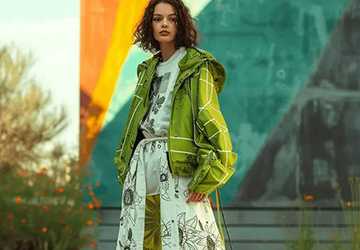Who Should Consider Ethical Fashion
Ethical fashion embodies an enlightened approach to apparel sourcing, manufacturing, and aesthetic crafting. It aims to augment societal and sectoral benefits while mitigating the environmental ramifications. This paradigm champions humane labour conditions, adopting sustainable production methodologies, and integrating biodegradable materials. Who are the primary beneficiaries of embedding such ethical practices within the fabric of the fashion industry?
Target Audience for Ethical Fashion
The target audience for ethical fashion is eclectic and includes:
- Eco-conscious Consumers: Individuals attuned to their consumption's ecological and societal impacts, endeavouring to make morally responsible choices.

- Progressive Youths: Millennials and Generation Z, who are predisposed towards sustainability and ethical considerations in their consumer behaviour.
- Trendsetters and Visionaries: Influencers and industry vanguards can mould public opinion and champion eco-friendly habits within the fashion arena.
These cohorts amplify the demand for ethically fashioned garments, compelling brands to embrace more sustainable and accountable manufacturing practices.
The Merits of Ethical Fashion
Ecological Benefits
The ecological dividends of ethical fashion are substantial. By curtailing waste, conserving essential resources, and diminishing toxic emissions, these sustainable practices preserve our environment for succeeding generations.
Advocating Worker Dignity
Ethical fashion ensures that industry labourers are accorded dignity, equitable wages, and safe working environments; this is especially vital in locales where labour protections might be insufficient.
Consumer Advantages
Purchasers of ethical fashion accrue benefits by obtaining products crafted under just and safe conditions. Moreover, endorsing ethical fashion aligns consumer spending with their moral standards, enhancing personal satisfaction and ethical congruence.
Business Implications
For enterprises, integrating ethical practices bolsters brand integrity, cultivates consumer allegiance, and penetrates new market segments. Such ethical undertakings can lead to streamlined operations and potentially reduced long-term expenses.
Who Benefits from Ethical Fashion
The ecosystem of ethical fashion beneficiaries is expansive:
- Community Empowerment: Sustainable fashion initiatives empower communities by ensuring fair remuneration and supporting local enterprises.
- Entrepreneurial Opportunities: Innovators and emerging businesses can exploit lucrative niches within the expanding ethical fashion marketplace.
- Astute Investors: As consumer demand for ethical apparel ascends, savvy investors stand to benefit by supporting frontrunners ethically and betting on their ascendancy and prosperity.
Evaluating Ethical Purchases: Should I Buy Ethical Fashion
Deliberating "sShouldI buy ethical fashion" involves assessing its comprehensive impact—ecologically, socially, and personally as a consumer. Here are compelling incentives to embrace ethical fashion:
1. Longevity and Craftsmanship: Ethical fashion is synonymous with durability, employing high-quality materials and craftsmanship that surpass the ephemeral nature of fast fashion.
2. Uniqueness: Ethical fashion is characterized by unique, timeless designs that defy conventional fast-fashion trends.
3. Consequential Consumerism: Each ethical fashion purchase contributes to a transformative change in the industry.
Amplifying Global Market Dynamics
Enriching Fashion Discourses
Adherence to ethical fashion principles diversifies consumer offerings and cultivates a more expansive narrative within the global marketplace. This narrative champions many cultural expressions, bringing forward the craftsmanship of diverse artisans and integrating global traditions into the mainstream fashion sphere, thereby enhancing the industry's inclusivity and diversity.
Transforming Consumer Insights
The growth of ethical fashion recalibrates consumer perceptions regarding the intrinsic value of their apparel. This transformation propels a market evolution, positioning ethical considerations as fundamental to consumer valuation alongside traditional metrics like cost and style. Such shifts cultivate a consumer populace prioritizing enduring societal and environmental impacts over fleeting satisfaction.

Elevating Brand Credibility and Reliability
Establishing Consumer Confidence
In today's market, where scepticism toward corporate motives is rampant and awareness of corporate responsibilities is heightened, integrating ethical fashion practices becomes a vital strategy for building consumer trust. Brands that transparently showcase their commitment to ethical sourcing and sustainability enhance their credibility and develop deeper, trust-based connections with their clientele.
Exploiting Ethical Accreditations
Brands enhance their competitive stance by obtaining ethical certifications, both a symbol of honour and a testament to their compliance with rigorous ethical standards. Certifications such as Fair Trade and Organic are more than mere labels; they are potent indicators of a company's dedication to maintaining high ethical standards across all operational facets.
Catalyzing Technological and Material Innovations
Innovating Sustainable Materials
The push for ethical fashion stimulates substantial innovation in developing sustainable materials less detrimental to the environment. Exploration of bio-based fabrics and recycled materials is accelerating, setting the stage for innovations that could transform traditional raw materials used in fashion production.
Revolutionizing Production Methodologies
Ethical fashion also catalyzes advancements in production methodologies that diminish environmental impacts. Emerging technologies such as water-conserving dye processes and energy-efficient manufacturing techniques are reshaping production practices, reducing operational costs and minimizing ecological footprints.
Empowering Community and Economic Development
Bolstering Local Economies
Ethical fashion significantly contributes to the empowerment of local economies by supporting artisans and small-scale producers. This backing sustains traditional crafts and promotes economic resilience within communities, particularly in less developed areas where such support is pivotal for communal prosperity.
Advancing Fair Trade Implementations
By committing to fair trade practices, ethical fashion ensures a more equitable profit distribution throughout the supply chain. This fair distribution enhances the living conditions of workers and their families, fostering socioeconomic advancement in areas historically marginalized by the mainstream fashion industry.
Augmenting Artistic and Cultural Expression
Celebrating Artisanal Heritage
Ethical fashion serves as a conduit for preserving and celebrating the artisanal heritage of diverse communities. Ethical fashion sustains traditional crafts and elevates them to the global stage by valuing the meticulous skills of artisans from various cultural backgrounds, enriching the industry's cultural tapestry.
Fostering Cultural Exchange
Through ethical fashion, there is an enhanced opportunity for cross-cultural exchange. Designers and consumers are exposed to different artistic expressions and storytelling techniques embedded in various cultures' textiles and designs, promoting greater understanding and appreciation.
Conclusion
The target audience for ethical fashion should consider how their purchasing decisions can catalyze extensive benefits. From alleviating environmental degradation to enhancing the livelihoods of industry workers, the impact of opting for ethical fashion is profound. If you ever ponder, "Should I buy ethical fashion?" think about the significant positive changes your choices can foster. As consumers, our influence in shaping the fashion industry is formidable and manifests through every conscious decision we make.


